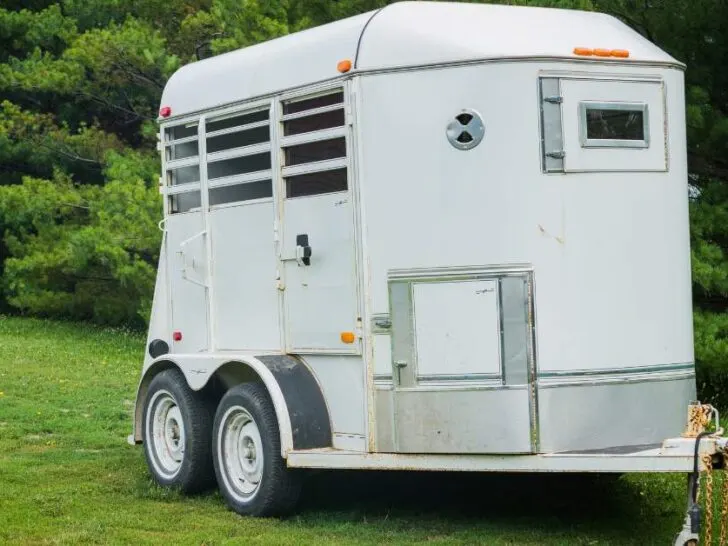Many people get confused between the truck and travel trailer tire types and think they can interchange them. It is technically possible but not recommended because of the safety concerns. The truck normally has LT (light truck) tires with different tread designs and crisscross groves. On the other hand, trailers use ST (Special Trailer) tires.
Can You Put Truck Tires on a Travel Trailer? You can put the truck tires on a travel trailer, but it is not recommended because of the different weight load capacities, which can cause sudden blowouts. People usually do this to achieve high-speed rating, decrease tire blow-out chances, and provide better rolling resistance. However, you have to consider load capacity, load index, tire size and compatibility, handling considerations, and tire tread design.
Selection of the right size and quality of tires is necessary to enhance safety during road trips. I did not purchase truck tires for my trailer because of the different sizes and quality. I always check the payload capacity, weather conditions, and speed rating before selecting them.
Is it possible to put truck tires on travel trailers?
It is OK to put truck tires on trailers, but it is better to avoid them because of the different weight-carrying capacities. You can do this technically, but recommendations for safety concerns are different.
Trailer tires are usually larger and made up of high-quality rubber material, with thick sidewalls to hold the weight of the trailer and the accessories present in the interior cabin.
It is not recommended because these wheels cannot hold the weight of the trailer and lead to sudden blows, which cause swaying and serious accidents.
In addition, it also increases the risk of premature wear and tear, and you have to replace them more frequently. You cannot do this because trailers require tires designed for slow speed.
It can also affect the warranty when you modify the factor-installed parts with new ones. You can also see several issues, including poor stability and handling and reduced towing performance because of the incompatibility of the tire with the trailer structure and weight.
Why would you put truck tires on travel trailers?
It is necessary to get help from the expert mechanics and manufacturers of trailers when you want to modify their components according to your preferences to enhance the performance. People usually prefer to replace the blown-out tire of their trailer with a new truck tire because of the durability and cost considerations.
High speed rating
Truck tires have high-speed ratings, designed to drive vehicles at high speed without overheating issues and wear and tear chances.
People want to install them in their trailers to increase the speed rating. Trailer wheels are designed to achieve a maximum speed of 70 mph.
Sometimes, you want to drive them at high speed to cover the distance in minimum time and improve the fuel efficiency of the towing vehicle.
Fewer blow-out chances
My friend replaced his trailer tire with the ones designed for the truck because of their better durability and fewer blow-out chances, which reduces the overall repair cost.
Tire blow-outs during road trips are frustrating because you cannot find the service centers and expert mechanic nearby for their replacement.
The issue worsens when you do not have a spare tire in the storage compartment to tackle emergencies.
Better rolling resistance
You can install these tires in travel trailers for better rolling resistance. They have better-rolling resistance to improve traction on the road surface.
It means they generate more energy to increase their rolling.
Raised rolling resistance is also helpful to improve the fuel economy of the towing vehicle.
Things to consider while putting truck tires on a trailer
You have to consider several things while fitting truck tires in your trailers. These things are necessary for smooth driving and reduce accidents and swaying issues. You can check these parameters from the numbers or alphabets mentioned on the tire’s sidewall.
Load Capacity
It is necessary to check the load-carrying capacity of the tire before putting it in your trailer. Trucks are usually smaller and light weight than trailers because of the number of components in both vehicles.
Trailers are heavier because of the presence of many amenities, including freshwater and wastewater tanks, which are the major contributor to increasing their overall weight.
You can install them if they have enough weight-carrying capacity. You cannot put them if their load capacity is incompatible with the trailer’s overall weight because it can cause wear and tear and sidewall damage.
Both conditions increase the risk of damage to the axle and swaying issue.
Load Index
Sometimes, one of the travel trailer tires gets damaged because of the unequal weight distribution and puncture, and you have to replace it with a new one.
My friend also faced the same issue, leading to the trailer swaying. He heard a loud sound while driving because of the damaged front right tire.
He wanted to put the truck tire for the replacement because it was readily available and affordable. I advised him to check the load index to reduce the risk of future damage.
The load index is the weight-carrying capacity of the individual tire and is mentioned on the sidewall. He checked it by looking at the side wall and installed it perfectly.
Tire size and compatibility
The size of the tires that trailers and trucks use depends on their dimensions, model, and gross vehicle weight. You have to check the size of the wheel while installing it in your trailer.
Some RVs use larger wheels to increase ground clearance and improve stability. You have to check the size and their compatibility with the wheel assembly while installing them.
Installation of the correct one is necessary for safety concerns and to enhance towing performance.
Handling considerations
You also have to check the handling consideration of the truck tire when you want to put it in your trailer. It is necessary for you to ensure that these provide better handling during driving.
The use of different ones can affect the overall handling and performance. Moreover, it can also affect the overall stability and cause swaying issues.
It can also void the vehicle’s warranty because of its poor handling and stability. You cannot achieve the towing stability, affecting the towing vehicle’s components. Poor handling and stability disturb the installation of several fixtures in the interior cabin.
Tread design
Several vehicles have different tread designs according to their weight. You should check their tread design because trailers usually use tires with narrower tread designs.
A narrower tread design width is better to raise the rolling resistance for better traction on different road surfaces. You can put them if they have narrower and shallow tread depth, which is helpful to achieve traction on snowy and wet roads.
The tread design also affects the overall performance and traction for stable driving. It is also helpful to reduce the uneven stress on axle and suspension parts.
Do travel trailers need special tires?
Travel trailer tires are different from other vehicles because these are not designed to provide the power for steering and braking response.
They need special trailer wheels with narrower and shallow tread designs for better stability and traction on road surfaces.
In addition, these are manufactured with high-quality and thick rubber material to hold more weight, which is comparatively more than passenger vehicles.
These are designed to dissipate heat generated during their spinning. The heat generated from trailer tires is more because they carry heavy weight.
They dissipate heat without any prominent wear and tear on the tread surface. They are beneficial to pull the trailer in a better manner while maintaining stability.
Related Articles:

